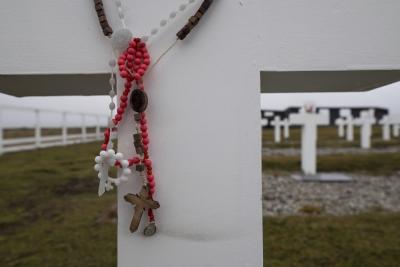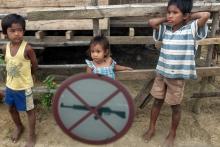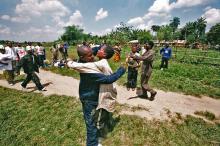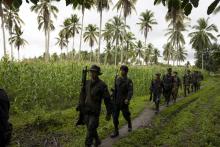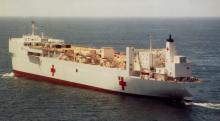Case prepared by Nina Bries, Lavinia Francesconi and Naomi Smith, LL.M. students at Leiden University under the supervision of Professor Robert Heinsch as well as Sofia Poulopoulou and Daniel Møgster (PhD researcher/researcher), Kalshoven-Gieskes Forum, Leiden University.
A. JOINT ACTION TO IDENTIFY THE UNKNOWN SOLDIERS
[…]
The relatives of 89 previously unidentified Argentinian soldiers killed during the 1982 invasion of the Falkland Islands will travel there this month to put names on their graves.
Their identification has been made possible due to painstaking DNA testing and the humanitarian initiative of a British captain who in 1982 gathered more than 120 dead soldiers, with their effects, and placed them in graves each marked with the words “Argentine soldier known only to God”.
[…]
The testing of the exhumed bodies by the International Committee of the Red Cross (ICRC) was agreed by the British and Argentinian governments in 2016 after a campaign led by both British and Argentinian veterans.
Key figures behind the campaign, including forensic experts from the ICRC, Roger Waters from the band Pink Floyd, and relatives of the unidentified soldiers, met on Friday at the Argentinian embassy in London to celebrate their joint act of reconciliation.
[…]
Nigel Baker, head of the South America department at the Foreign Office, said: “We were clear this was a humanitarian issue in which the wishes of the family were paramount.” He paid tribute to the veterans’ groups who “continue to teach us the real meaning of the words dignity and reconciliation”.
The identification process was only possible thanks to Geoffrey Cardozo, a British army captain who speaks Spanish. Dispatched to the Falklands in 1982, initially to deal with post-combat discipline, he spent six weeks helping build a cemetery for the largely conscripted soldiers that British forces found scattered – sometimes half-buried – across the islands. He put white sheets and plastic bags over each body and buried each soldier with a casket containing any effects he could find on them such as ID numbers or letters for home. He compiled a logbook of where he had found the bodies, any identifying marks and where they were buried.
Cardozo said: “I am an army officer, I am a soldier but before everything else I am a human being. Nine hundred little hearts stopped beating in 1982, although they still beat hard in the breasts of their loved ones.”
In 2008 he gave the logbook to three Argentinian veterans. One of the three was Julio Aro, who had visited the cemetery in 2008 and formed the No Me Olvides (do not forget me) foundation. Aro said he had been driven to identify the dead because his mother had told him: “If you had ever gone missing, I would have searched for you until the end of my life.” He said he knew that if he had died he would not have been identifiable since his name was not engraved, just scrawled on a piece of paper with sticky tape.
Waters said he joined the campaign when touring in Argentina in December 2011. At that time he received an email from an Argentinian war correspondent, Gaby Cociffi, which led him to lobby the Argentinian president.
Waters said: “These families has suffered a double bereavement of losing a child to war and having no specific place to shed a tear, or lay a flower.”
[…]
At the embassy he read out part of the appeal he had sent to Falklands legislators urging them “to imagine the anguish of the families, rise above the melee, take the higher moral ground and that it would be a beautiful thing if they were able to do that”. Eventually they did take that higher ground, he said.
As a result of the campaign, in December 2016, the two governments finally reached agreement on a [multidisciplinary forensic (ed.)] process in which the ICRC was given the task of identifying the former soldiers.
Laurent Corbaz, head of the ICRC humanitarian project plan, liaised with relatives of the dead soldiers and obtained DNA samples from members of the 107 families to attempt to match against the DNA found in the graves. No one could predict the state of the bodies.
Corbaz said: “For seven weeks in July last year, the Falklands winter, we worked at the cemetery exhuming 122 corpses, taking DNA samples at a morgue and then placing the remains back in new coffins. It was unlike anything we had done before. We had to deploy sensitive equipment and a hi-tech mortuary.” The DNA samples were sent to a morgue in Argentina and were cross-checked in the UK and in Spain.
Morris Tidball-Binz, [forensic specialist with the ICRC (ed.)], said: “Sometimes we had to resample the relatives’ DNA for missing soldiers if the family relationship was not close. We set a standard of 99.8% certainty. It was very exacting: a few years back the science would not have allowed us.”
Asked how he felt on meeting fellow campaigners such as Cardoso for the first time, Waters said: “It is a gift from time and space to be allowed to show empathy and love for a fellow human being.”
Or as the Argentinian ambassador put it: “Sometimes great tragedies bring great gestures and exemplary actions.”
[…]
The project had been in the pipeline for years. In 2012, on the 30th anniversary of the conflict, the Cristina Fernández de Kirchner administration initiated a similar process, but it ran into a wall […].
[…]
Talks were resumed when Mauricio Macri became the new president of Argentina. As part of its plan to improve relations with London, the Foreign Ministry issued a release on June 17, 2016 stating that it was allowing the Red Cross to travel to the islands “based on the strictly humanitarian nature of this initiative.”
B. HUMANITARIAN PROJECT PLAN BETWEEN ARGENTINA, THE UK AND THE ICRC ON THE IDENTIFICATION OF THE REMAINS OF UNIDENTIFIED ARGENTINIAN SOLDIERS
[
Source: Humanitarian Project Plan between the Argentine Republic and the United Kingdom of Great Britain and Northern Ireland and the International Committee of the Red Cross on the Identification the Remains of Unidentified Argentine Soldiers Buried in Darwin Cemetery, Falklands Islands (Malvinas), 20 December 2016,
https://www.boletinoficial.gob.ar/pdf/pdfAnexoPrimera/5302944A01.pdf/20170421/0]
Preamble
Considering [...]
That the AR [Argentina] and the UK have committed to bring an answer to the families in accordance with their obligations under IHL to help identify the unidentified Argentine soldiers buried in Darwin cemetery;
That the ICRC, vested by the mandate of a neutral, impartial and humanitarian organisation, is committed to support the AR and the UK in their efforts to identify the human remains of the unidentified soldiers in order to bring answers to their families;
The Parties have decided on the following:
Article 1. Purpose and Scope of the HPP
The AR and the UK request and allow the ICRC to carry out the identification of the remains of the unidentified Argentina soldiers located in 123 graves in Darwin cemetery with the aim of providing the most likely identity of the deceased with an exclusively humanitarian objective of helping provide answers to their families, in accordance with the terms and modalities of the HPP [Humanitarian Project Plan]. […]
Article 2. Legal Framework and Governing Principles
The HPP and all activities under the HPP will be governed and guided by the following principles:
1) The Parties will engage in the implementation of the HPP with exclusively humanitarian objectives and for the sole purpose of providing the most likely identity of unidentified Argentine soldiers buried in Darwin cemetery in order to provide this information to their families.
2) The approach of the Parties with regard to the activities related to the HPP will be strictly humanitarian, refraining from any action that may contravene, undermine or impede the humanitarian nature and objective of the HPP.
[…]
5) The Parties will respect and preserve the dignity of unidentified soldiers, their human remains and their families throughout the process.
6) The AR and the UK will ensure that the ICRC is in a position to carry out all activities of the HPP in full conformity with its Fundamental Principles of neutrality, impartiality and independence, as recognized and defined in the Statutes of the International Red Cross and Red Crescent Movement.
[…]
C. DIPLOMACY AT THE SERVICE OF HUMANITARIAN OBJECTIVES
The International Committee of the Red Cross (ICRC), the Permanent Mission of the Argentine Republic and the Permanent Mission of the United Kingdom are jointly organizing the event "Diplomacy at the Service of Humanitarian Objectives" on 21 November 2018.
This comes nine months after the ICRC presented the Argentine and UK governments with its final report on the Humanitarian Project Plan. […]
The event will reflect on the factors that made the negotiations between the two governments a success, the importance of international humanitarian law, and the neutral, impartial role played by the ICRC in bringing answers to dozens of family members who had been waiting for years to find out where their loved ones were buried.
It will also be an opportunity to discuss best forensic practice as developed in the course of the project.
[…]
The Humanitarian Project Plan on the Falkland/Malvinas Islands was the first forensic initiative to be conducted under such a specific mandate conferred by two countries that had been engaged in an international armed conflict.
It all began in 2012, when the government of Argentina approached the ICRC to request its help as a neutral intermediary in identifying the Argentine soldiers.
The work in 2017 and 2018 was the culmination of diplomatic talks that began in 2016 and resulted in Argentina and the UK agreeing to task the ICRC with identifying the soldiers who died during the conflict and were buried in graves bearing the inscription "Soldado argentino solo conocido por Dios" (Argentine soldier known only to God). […]
The objectives of initiatives like the Humanitarian Project Plan are provided for in the Geneva Conventions and are central to the ICRC's wider mission to prevent and resolve cases of people going missing in armed conflict.
In the case of Darwin cemetery, identifying the soldiers buried there fulfils the humanitarian purpose of bringing answers to the families of the missing.
[…]
“The main aim of this work was to allow the families to grieve with dignity,” said ICRC operations director Dominik Stillhart, opening the event. In addition to the human aspect, Stillhart emphasized the importance of international humanitarian law and the diplomatic process related to the HPP. “The United Kingdom and Argentina worked together to define, develop and achieve a common humanitarian objective. I hope that other States will draw inspiration from their example,” he concluded, underlining the role of neutral intermediary that the ICRC had played.
[…]
The event included Argentina’s Secretary for Human Rights and Cultural Diversity, Claudio Avruj, the UK Permanent Representative in Geneva, Julian Braithwaite, former soldiers Geoffrey Cardozo and Julio Aro, the chair of the Families’ Committee, María Fernando Araujo, and Morris Tidball-Binz, who is in charge of the forensic aspects of the HPP. Argentina’s Permanent Representative to the UN, Carlos Foradori, was also present, as was Roberto Curilovic, representing Corporación América.
Grief
“One has to recognize that Argentina is grieving for its heroes and its families,” said Avruj, adding that it was time for answers. He saw the HPP as a “milestone in modern history” and an “example of the value of humanitarianism”.
Julian Braithwaite pointed out that the HPP was dealing with a sensitive humanitarian issue, and that the priority was to respond to the wishes of the families affected. He felt that the HPP was “a good example of how the ICRC and international humanitarian law can rise above politics to prioritize the needs of people affected by conflict,” adding that the ICRC had played a key role in enabling Argentina and the United Kingdom to work together.
Forensic specialist and member of the expert panel Mercedes Salado explained that her work went beyond simply getting forensic information to the soldiers’ families. She said that the project had carried an additional, very different meaning for her and the whole Argentine Forensic Anthropology Team. “We never thought that we would find them buried with respect and dignity, and with the clear intention of preserving them for the future. That touched me.”
Morris Tidball-Binz pointed out that “For each family, the last 36 years have been like walking around with a stone in your shoe. Now they can remove it.” He handed over stones from Darwin Cemetery to María Fernanda Araujo, chair of the Families’ Committee, for her to take back to the Committee’s offices.
Araujo’s brother was among those identified under the HPP, and she gave a moving account of her family’s experience. When their mother received the results confirming that her son had been buried with dignity, she said “I would like to kiss the hands that wrapped up my son. It doesn’t matter whether they were English, Scottish or Eskimo, the hands that wrapped my son were the hands of a human being. It was like giving birth again.”
Araujo said that at that moment, she finally understood. Her mother was referring to the work of Geoffrey Cardozo, who set up the cemetery in 1983, the year after the conflict.
Cardozo was also present, and talked about the experience of burying the Argentine soldiers. “It wasn’t me. It was the human being in me that made this possible,” he said. Julio Aro, who fought in the conflict on the Argentine side, saw Cardozo’s work as evidence of a humanitarian attitude. “It’s a matter of putting yourself in the other person’s shoes. What we did was done with love, out of a desire to serve.”
[…]
Discussion
I. Classification of the Situation and Applicable Law
1. How would you classify the situation between Argentina and the United Kingdom in 1982? Was there an armed conflict? What was the law applicable to the situation? Was Additional Protocol I applicable to the situation? Why/why not? (
GC I-IV, Art. 2;
PI, Art. 1)
II. Identification of Soldiers’ Remains
2. What are the obligations of the parties to the conflict in relation to the search, collection, identification and burial of the dead under IHL? What is the temporal scope of those obligations? Does the end of the conflict dissolve the belligerents of their obligations towards the dead? (
GCI, Art. 15,
16,
17;
PI, Art. 34;
CIHL, Rules 112, 116)
III. Elements Contributing to Respect for IHL
4. Why is it important, even long after the end of hostilities, to identify dead persons and to give them decent burial? For the relatives of the dead? For society in general? For the parties? What do you think of the idea of carrying out a public ceremony?
5. (Document A) Can the pressure from civil society – composed of those affected by the phenomenon, of veterans, and even of a famous rock musician – contribute to compliance of relevant IHL obligations by parties to the conflicts? How can they influence the behavior of those who have primary responsibilities under IHL? Why did the UK diplomat say that veterans “continue to teach us the real meaning of the words dignity and reconciliation”?
6. (Document A) Do you agree that “empathy and love” have a role to play in respect for IHL?
7. (Document A) What is the link between clarifying the fate of the missing persons and the process of reconciliation? What role did Argentina’s interest to “improve political relations” with the UK contribute to this humanitarian project?
8. (Document C) What role did diplomacy play in reaching the humanitarian agreement? Do you agree that “IHL can rise above politics to prioritize the needs of people affected by conflicts"?
9. Do you agree that the fact that the identification of the fate of missing persons is a “purely humanitarian matter” facilitated the coordination of efforts of the parties to comply with their legal obligations?
10. How can neutral intermediaries like the ICRC help overcome the political differences that may stand in the way of resolving humanitarian issues?
11. (Document C) Can “other States draw inspiration from the [Argentine and UK] example”? Can sharing best practices between parties to conflicts play a role in favoring compliance with IHL obligations?

